The University of Divinity research community recently gathered in person for the annual Research Conference held on Wednesday 7 June 2023. During the conference, we celebrated publications written by our academics, honorary researchers and HDR students that had been published in the last 12 months (since the previous Research Conference). We invite you to explore the books below.
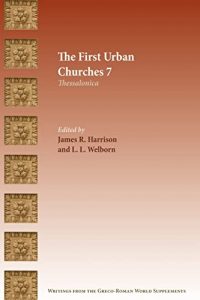
Infants, Orphans, Children and Siblings: Strengthening the familial bonds of the ekklēsia of the Thessalonians in God the Father and the Lord Jesus Christ
Chapter in The First Urban Churches Vol 7: Thessaloniki
From the opening of 1 Thessalonians the topos of the ekklēsia of the Thessalonians is located in God the Father and the Lord Jesus Christ. I will illuminate how, by the deft employment of familial imagery, the author/s of this letter visualise/s the relationships of Paul and his co-workers with the believers at Thessaloniki in God the Father and the Lord Jesus Christ in terms of familial bonds. This visualisation acts as a rhetorical tool to strengthen the believers in their mutual relationships and so strengthen the topos of their ekklēsia, shoring up their identity in God and Christ in the face of persecution (1Thess 1:6; 3:4). The visual texture situates the members and their teachers in aesthetically emotive family relationships of love and care for each other, maintaining all in God’s care and in relationship with Jesus Son of God who rescues them from the wrath that is to come. The emerging discourse for this community in Thessaloniki is grounded in the reconfiguration of familial relationships which bind them together and describe their identity in the ekklēsia.
Publication detailsMercy (ἐλέεω) in the Gospel According to Mark
Mercy (ἐλεέω) occurs only three times in the Gospel of Mark once in the story of the Gerasene demoniac (5:19) and twice in the story of Bartimaeus (10:47, 48). The appearance of ‘mercy’ in these two episodes delineates these two specific occasions: one where Jesus and his disciples (they) “came to the other side, to the country of the Gerasenes” (5:1) and the other as Jesus (he) “and his disciples and a large crowd were leaving Jericho” (10:46), and Bartimaeus is sitting by the way or road (ὁδος). This article will investigate the significance of mercy in these two pivotal texts and elucidate insights for today.
Publication details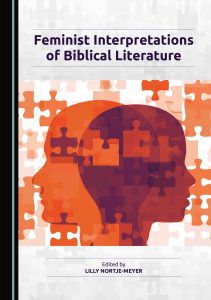
Constructions of Gender: Early Australian Feminists and Notions of Gender in a HB Creation Story
Chapter in Feminist Interpretations of Biblical Literature
Publication detailsGrowing dissatisfaction: Mass attenders’ attitudes to the sexual abuse crisis in the Catholic Church
Chapter in Encountering God: Practical Theology and the Mission to Heal
Robert Dixon – Publication forthcoming June 2023
Australian Catholicism in the third phase of globalization: Demographic shifts and unceasing challenges
Chapter in Asian Pacific Catholicism and Globalization: Historical Perspectives and Contemporary Challenges
Robert Dixon – Publication forthcoming June 2023
Encountering God: Practical Theology and the Mission to Heal. Explorations in Practical Theology series
Robert Dixon and Mary Eastham – Publication forthcoming June 2023
The Australian Plenary Council: a Bold Beginning, with Much Further to Go
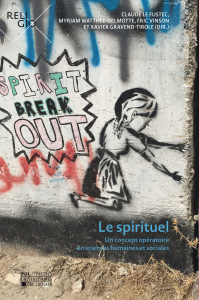
The Dialectic Between Experience and Expression
Chapter in Le spiritual, un concept opératoire en sciences humaines et sociales
Gorgias (c. 485-c. 380 BCE), the Greek Sophist, states bluntly : “Nothing exists ; even if
something exists, nothing can be known about it ; and, even if something can be known
about it, knowledge about it cannot be communicated to others.” The three parts of this article respond to Gorgias’ three blunt statements. It draws on a variety of authors from the Christian East and locates them within the overarching outlook of Abhinavagupta (c. 975-1025 CE) who, long recognised as the most significant teacher of aesthetics in Indian history, is now also considered to be one the most significant philosophers, equal to Śaṅkara (c. 788-820 CE). He wrote many works of philosophy, the
greatest of which is his Tantrāloka.
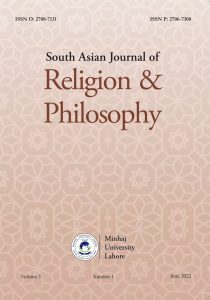
Interfaith Dialogue: the way forward for Christianity and Understanding Incarnation Theology
Chapter in South Asia Journal of Religion and Philosophy, vol. 3, no. 1
The three Abrahamic traditions, each in their own way, proclaim that the Almighty has spoken his Word to human beings who, in return speak their words of prayer and praise. Such is the dialogue between heaven and earth. It is entirely proper, therefore, that the members of these traditions should engage in interfaith dialogue, and not only they but also the members of non-Abrahamic traditions, who proclaim a communication between the transcendent and earthly spheres. Christianity for its part proclaims that Jesus of Nazareth is the Word made flesh (Jn. 1:14), for which the theological term is ‘incarnation’.
In this article, I note that the Catholic Church now acknowledges and welcomes all that is true and holy in other religions. I then examine the four interfaith dialogues – of life, of cooperation, of theological exchange and of spiritual experience – making the point that they do not constitute a threat to Christianity, but on the contrary open up new paths and possibilities for its development, and particularly for understanding more fully the incarnation of the Word. Indeed, I propose that Christians can listen to and learn from non-Christian religions in such a way that they grasp their own tradition more clearly and assent to it more wholeheartedly. Meeting and working with others are forms of incarnation; learning from others and experiencing their religious experience are other forms of incarnation.
In this way, the unique and unparalleled enfleshment of Jesus Christ can be appreciated more fully. I also make the point that these four forms of interfaith dialogue, examined from the Christian point of view, are applicable to other faiths. I will at times recount some personal anecdotes that exemplify how my interfaith experiences have helped me better understand incarnation theology.
Publication details
Inter-Religious Dialogue in Australia: Achievements and Challenges
Chapter in South Asian Journal of Religion and Philosophy vol. 3, no. 2
With regard to cultures and faith traditions, Australia is one of the most diverse nations in the world. At the same time, it is remarkably if not perfectly harmonious. What lessons can be gleaned from its successes and failures? This article will consider aspects of interfaith dialogue in Australia within the three categories of exclusivism, pluralism and inclusivism, and with particular reference to the Catholic tradition which I know best. The Australian experience may be useful to compare and contrast with other contexts.
Publication details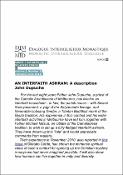
An interfaith Ashram
For the last eight years Father John Dupuche, a priest of the Catholic Archdiocese of Melbourne, has lived in an interfaith household – in fact, the parish house – with Swami Sannyasanand, a yogi of the Satyananda lineage, and Venerable Lobsang Tendar, a Tibetan Buddhist monk of the Gyuto tradition. His experience in this context and his wider interfaith activities in Melbourne have led him, together with Father Michael Mifsud, an Oblate of the Camaldolese tradition, to wish to set up a fully fledged interfaith ashram. They have drawn up this “rule” and would appreciate comments from readers. Their experience in November 2010, also reported in this issue of Dilatato Corde, has shown the immense spiritual value of such a context for opening up the Christian mystery in ways we had never imagined possible. It will also show how humans can live together in unity and diversity.
Publication details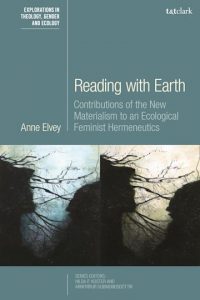
Reading with Earth: Contributions of the New Materialism to an Ecological Feminist Hermeneutics
Applying a re-envisioned, ecological, feminist hermeneutics, this book builds on two important responses to twentieth- and twenty-first-century situations of ecological trauma, especially the complex contexts of climate change and cross-species relations: first, ecological feminism; second, ecological hermeneutics in the Earth Bible tradition.
By way of readings of selected biblical texts, this book suggests that an ecological feminist aesthetic, bringing present situation and biblical text into conversation through engagement with activism and literature, principally poetry, is helpful in decolonizing ethics. Such an approach is both informed by and speaks back to the new materialism in ecological criticism.
Publication details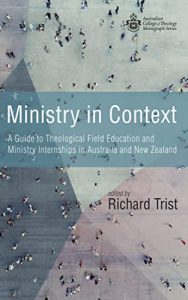
Calling and Vocation: The Grace of Unfolding Identity and Purpose in Christ
A chapter in Ministry in Context: A Guide to Theological Field Education and Ministry Internships in Australia and New Zealand
Semi-autobiographical, Sean’s input will posit that ‘Christian ministry is constituted and sustained by the gracious action of the Holy Trinity.’ This affirmation being argued and held in tension with contemporary educational and resourcing stresses (and demonstrable fatigue) on skill-development, social networking and technological innovation.
Publication detailsOut of Silence: an exploration into the language of faith
Chapter in Uniting Church Studies, Vol 24, No. 1
Publication details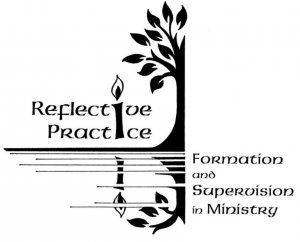
Poetics and Reflective Ministry Practice: A Vital Exercise of Imagination
Chapter in Reflective Practice: Formation and Supervision in Ministry, Vol. 43
It’s not uncommon when introducing ministry students to the expansive world of poetics to spy the rolling of eyes or to hear from braver souls, “I don’t do poetry.” Akin to the lingering experiences of a music teacher who told us we couldn’t sing or the English lecturer who forced us to unravel a poem’s complex form, my strategic use of poetry in ministry-related topics is often met with initial bemusement and even notes of resistance. Given poetry’s cultural discordancy as a non-informational, indirect form of speech, of what strategic and lasting use can it be, particularly in near-desperate church modes of “relevance” and missional endeavour? Happily, experience has taught me to hold my nerve and persevere! Resonant connections of call and renewed meaning are made in surprising places for both teacher and student.This article argues for the practicality of poetry in terms of encouraging a clearer pastoral identity and vocational purpose, which in turn deepens ministry confidence and imaginative capacity.
Publication detailsDialogues of the Secular and Sacred in Mid-Twentieth Century Australian Culture
Kerrie Handasyde and Katharine Massam
Publication details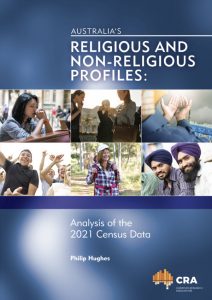
Australia’s Religious and Non-religious Profiles: Analysis of the 2021 Census Data, Christian Research Association
The Australian Census provides us with a very detailed picture of religious identity. In the tables of data that are publicly available, 150 religious groups are identified. Details of the gender, age, birthplace, education, languages spoken, and a host of other information is available for all the people who identify with each of these groups. Information is also available about where these people live withing Australia, down to small sections of suburbs and tiny rural towns. This detailed data provides us with the basis for analysing in depth what is happening to religion in Australia at a level not available anywhere else in the world.
Philip Hughes is professor at Alphacrucis University College, and an honorary Research Fellow at the University of Divinity, the National Pastoral Research Centre and the Christian Research Association. For 31 years, he was the senior research officer with the Christian Research Association. He is ordained in the Uniting Church in Australia.
Publication details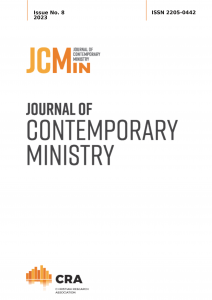
Re-Building Confidence as a Prelude to Ministry
Chapter in Journal of Contemporary Ministry
In order for the churches to exercise ministry in Australia, there must be confidence in them. While confidence in a range of systems and organisations has been falling over recent decades, in 2018 just 11 per cent of the adult population indicated a great deal or complete confidence in the churches and religious organisations, having fallen from 22 per cent in 2009.
Building public confidence will need to address these issues of the perception of power, building the perceptions that the churches are contributing to peace, that they treat women and men equally, and that they are tolerant. It also means addressing its “knowledge base”, helping people to understand the meaningfulness of the concept of God.
Publication details
Bordered by COVID-19 and the EU-27: Imagining a theology of global domicile
Chapter in Journal of Contemporary Ministry
The European Union legislates the free movement of people, capital and goods, within and between its member states. This political commitment has been hard-pressed by the undocumented migrants entering the EU. The COVID-19 pandemic catalysed restrictions upon the free movement of people within the EU. Whilst legal, these restrictions posed a significant existential threat to the EU. Accompanying these is an increasing tendency to prioritise the claims of the nation state above all other obligations, including those of international law or any sense of moral or ethical obligation. European churches play an active role in refugee advocacy and welfare, fostering processes of welcome and integration, accompanied by the development of ecclesiologies that simultaneously transcend borders and acknowledge their legal and political necessity. This paper highlights the responses of nation-states to migrants and contrasts these with a constructive diaspora theology that is fit for purpose within the context of the European Union and its member states.
Publication details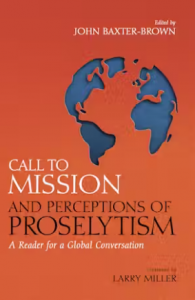
Proselytism in a Central and Eastern European Perspective
Chapter in Call to Mission and Perceptions of Proselytism: A Reader for a Global Conversation
I am a contextual missiologist, formerly employed by the Conference of European Churches (CEC) as a researcher in European Mission and Evangelism. The membership of CEC is both Protestant and Orthodox (Eastern and non-Chalcedonean). Given this constituency, CEC has been required to pay constant attention to issues of proselytism when discussing mission and evangelism.
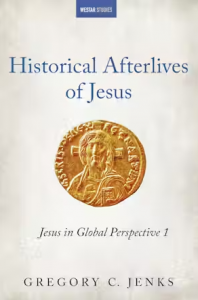
Historical Afterlives of Jesus: Jesus in Global Perspective 1
This collection of essays explores the impact of Jesus within and beyond Christianity, including his many afterlives in literature and the arts, social justice and world religions during the past two thousand years and especially in the present global context. This first volume focuses on selected historical afterlives of Jesus, including the Pantokrator of Byzantium and the Aryan Jesus of Nazi Germany. This collection is not an exercise in Christian apologetics, nor is it an interfaith project–except in the sense that many of the contributors are from a Christian context of some kind, while others are from other contexts. The contributors include scholars in relevant fields, as well as religious practitioners reflecting on Jesus in their own cultural and religious settings. While the essays are original work that is grounded in critical scholarship, reflective practice, or both, they are expressed in nontechnical language so the information is accessible to intelligent nonspecialists.
Publication details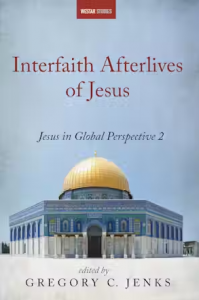
Interfaith Afterlives of Jesus: Jesus in Global Perspective 2
Gregory Jenks
This collection of essays explores the impact of Jesus within and beyond Christianity, including his many afterlives in literature and the arts, social justice, and world religion during the past two thousand years and especially in the present global context. This second volume focuses on the diverse interfaith afterlives of Jesus. Moving beyond the explicitly Christian afterlives traced in volume one, this set of essays explores how Jesus has significant afterlives in Islam, Judaism, Hinduism, Ruism and Mormonism, as well as selected secular afterlives in progressive Christianity. The contributors include religion scholars from the respective traditions, as well as faith practitioners reflecting on Jesus within their own religious context. While the essays are all grounded in critical scholarship, reflective practice, or both, they are expressed in nontechnical language that is accessible to interested nonspecialists.
Publication details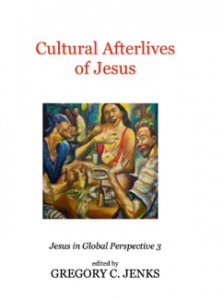
Cultural Afterlives of Jesus: Jesus in Global Perspective 3
Gregory Jenks – Forthcoming
Publication details
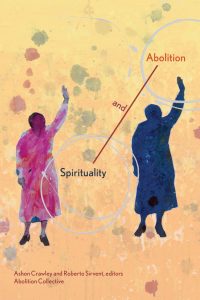
God is Blackness: Mysticism of the Unowned Earth
Chapter in Abolition: A Journal of Radical Theory and Practice
To posit the spirituality of abolition is to consider the ways historical and contemporary movements against slavery; prisons; the wage system; animal and earth exploitation; racialized, gendered, and sexualized violence; and the death penalty necessitate epistemologies that have been foreclosed through violent force by Western philosophical and theological thought. It is also to claim that the material conditions that will produce abolition are necessarily Black, Indigenous, queer and trans, feminist, and also about disabled and other non-conforming bodies in force and verve.
Spirituality and Abolition asks: what can prison abolition teach us about spiritual practice, spiritual journey, spiritual commitment? And, what can these things underscore about the struggle for abolition as a desired manifestation of material change in the worlds we currently inhabit? Collecting writings, poetry, and art from thinkers, organizers, and incarcerated people, the editors trace the importance of faith and spirit in our ongoing struggle towards abolitionist horizons.
Publication details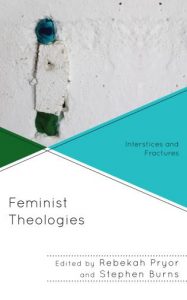
Against Innocence: Feminism and Original Sin
Chapter in Interstices & Fractures: Feminist Theologies
This assemblage of feminist theologies represents a series of vital entanglements. Chapters are written from different cultures, geographies and discourses and brought together around themes as specific and wide-ranging as immigration detention, hate crime, discrimination, rites of marriage and partnership, and artistic and religious imagination. The contributors variously echo, celebrate, question and contradict each other. Despite the complexity and allied as they are with liberation, decolonial, ecological, queer and other theologies, these perspectives seek not only to confront and resist the problems, oppressions, and omissions of hegemonic theologies but also to realize better worlds.

Becoming Flesh
Chapter in Afterlives: Jesus in a Global Perspective
This collection of essays explores the impact of Jesus within and beyond Christianity, including his many afterlives in literature and the arts, social justice and world religions during the past two thousand years and especially in the present global context. This first volume focuses on selected historical afterlives of Jesus, including the Pantokrator of Byzantium and the Aryan Jesus of Nazi Germany. This collection is not an exercise in Christian apologetics, nor is it an interfaith project–except in the sense that many of the contributors are from a Christian context of some kind, while others are from other contexts. The contributors include scholars in relevant fields, as well as religious practitioners reflecting on Jesus in their own cultural and religious settings. While the essays are original work that is grounded in critical scholarship, reflective practice, or both, they are expressed in nontechnical language so the information is accessible to intelligent nonspecialists.
Publication details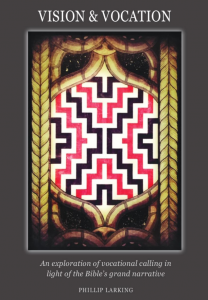
Vision and vocation: An exploration of vocational calling in light of the Bible’s grand narrative
Phillip Larking
Vocation is about the meaning we associate with our work. This book explores the themes of vocation and purpose through the lens of the Bible’s grand narrative. Written from a Christian perspective, this text takes an invitational stance towards all people to engage with the content from the perspectives of their own life experiences, worldview, and values. When we are captured by a vision for shalom, defined as flourishing communities, we can find our unique place in God’s big vision.
Publication details
Jesus Calms the Storm: Mark 4:35-41
Chapter in In Her Voice: Raising Women’s Voices in Preaching the Gospel
Elizabeth Lee
In Her Voice: Raising Women’s Voices in Preaching the Gospel contains Sunday gospel reflections based on sermons delivered as podcasts for the weekly series Australian Women Preach. They have been written by a diverse group of Australian women who are passionate about Scripture and preaching the Word. The podcast and this companion book aim to normalise the voice of women preaching in a context where many women are excluded from doing so in Sunday worship. When you read this selection of intelligent, heartfelt, and stirring reflections, you will surely wonder why.
Publication details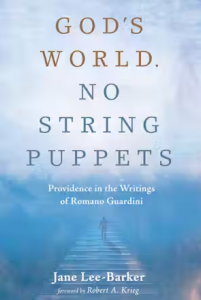
God’s World. No String Puppets: Providence in the Writings of Romano Guardini
We live in a world facing many crises, pandemics, climate and environmental challenges, human rights abuses, and threats of totalitarian regimes. Romano Guardini (1885-1968), a major influencer of Pope Benedict XVI and Pope Francis, worked through one of the most difficult periods of German history–the first half of the twentieth century. What does he have to say to these challenges, and how is his notion of providence relevant today? Jane Lee-Barker shows how Guardini’s insight and deep thought on God’s providence weave their way through his work, enabling the reader to fully appreciate “God’s world.” In relationship with God, the human person is invited to participate in responsible care for the world while responding to their own vocational call from the God who sustains him or her.
Publication details
Hyperbole and the Cost of Discipleship: A Case Study of Luke 14:26
Chapter in Harvard Theological Review
Stephen Llewelyn
Luke 14:26 has commonly been viewed as an example of hyperbole. This article applies modern studies on hyperbole that hold as its principle criteria both a scalar property and an evaluative/expressive function. We apply these criteria, analyzing Luke 14:26 in terms of encoded language, co-text, and context. We argue that hyperbole arises from the choice to use “hate” rather than “love more than” but also that the hyperbolic usage relies on a cause for effect (emotion for emotional response) metonym. 1 In terms of language, we show that “hate” has variant meanings that may be different in their degrees of encoding. In terms of co-text, we argue that Luke’s use of “hate” and Matthew’s use of “love more than” are relevantly chosen; in other words, they are suited to and to be interpreted against their co-texts.
Publication details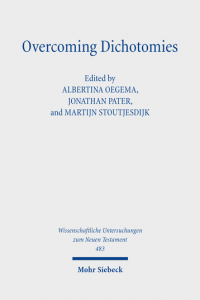
Cognitive blending theory and the Mashal of the Forest and the Sea in 4 Ezra 4:13–17: the boundedness of human knowledge
Chapter in Overcoming dichotomies: parables, fables, and similes in the Graeco-Roman world
Stephen Llewelyn
This volume aims to broaden our understanding of the related genres of parables, fables, and similes in the Graeco-Roman world. These genres, which make use of narrative analogy, appear in early Christian and ancient Jewish literatures and in various Graeco-Roman sources. However, despite the fact that these texts were part of the wider cultural context of Graeco-Roman antiquity, they have not yet been thoroughly studied in relation to each other. The present volume brings together contributions on a range of Graeco-Roman, Jewish, and Christian sources, so as to contribute to the study of parables, fables, and similes across disciplinary boundaries. The contributions highlight the fluid boundaries between these different genres, but also demonstrate how their adoption and adaption in different literary works give expression to the distinct identities of the composers.
Publication details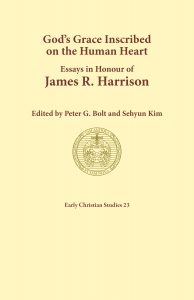
The salt parable (Mark 9:50, par. Matthew 5:13 and Luke 14:34–35)
Chapter in God’s grace inscribed on the human heart: essays in honour of James R. Harrison
Stephen Llewelyn
The salt parable is structured as a counterfactual conditional that asked of its original hearers a question. When first uttered, co-text and context would have given clues to the issue that prompted the question and its corresponding answer. Mark, Matthew and Luke lacked such clues but used their narratives to provide to its new hearers an insight into its meaning; they differ, however, as to whether salt is used as a metaphor for the disciple (Matthew and Luke) or a quality possessed by the disciple (Mark). The curious use of μωρανθῇ in Q has contributed to this difference and shows, it is argued, that the translator (?) had sought to provide a clue as to the target domain of the salt parable.
Publication details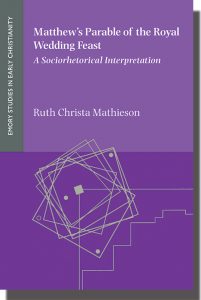
Matthew’s Parable of the Royal Wedding Feast. A Sociorhetorical Interpretation
Ruth Christa Mathieson’s unique reading of Matthew’s parable of the royal wedding feast (Matt 22:1–14), which concludes with the king’s demand that one of the guests be bound and cast out into the outer darkness, focuses on the means of the underdressed guest’s expulsion. Using sociorhetorical interpretation, Mathieson draws the parable into conversation with early Jewish narratives of the angel Raphael binding hands and feet (1 Enoch; Tobit) and the protocol for expelling individuals from the community in Matt 18. She asserts that readers are invited to consider if the person who is bound and cast out is a danger to the little ones of the community of faith unless removed and restrained.
Publication detailsChristian Perspectives on Science and Theology
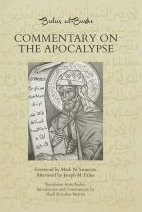
Commentary on the Apocalypse
The 13th century Egypt saw a circle of Coptic theologians who passionately endeavored toward the revival of the Coptic Orthodox Church. Bishop Bulus al-Bushi was among those notable Church treasures, and dedicated much of his effort to biblical exegesis. In this book, readers will gauge one of his largest works entitled “Commentary on the Apocalypse” which presents a dogmatic and pastoral interpretation of the biblical text. This English translation honors the work of the late Abbot of St Macarius Monastery, Bishop Epiphanius (1954-2018), who published an Arabic edition of al-Bushi’s commentary in 2017.
Publication details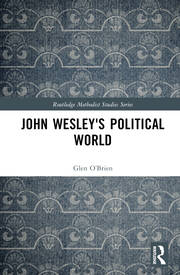
John Wesley’s Political World
This book employs a global history approach to John Wesley’s (1703–1791) political and social tracts. It stresses the personal element in Wesley’s political thought, focusing on the twin themes of ‘liberty and loyalty’. Wesley’s political writings reflect on the impact of global conflicts on Britain and provide insight into the political responses of the broader religious world of the eighteenth century.
They cover such topics as the nature and origin of political power, economy, taxes, trade, opposition to slavery and to smuggling, British rule in Ireland, relaxation of anti-Catholic Acts, and the American Revolution. Glen O’Brien argues that Wesley’s political foundations were less theological than they were social and personal. Political engagement was exercised as part of a social contract held together by a compact of trust.
The book contributes to eighteenth-century religious history, and to Wesley Studies in particular, through a fresh engagement with primary sources and recent secondary literature in order to place Wesley’s writings in their global political context.
Publication details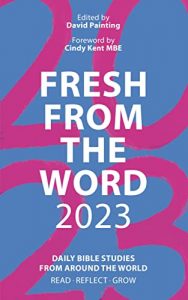
Who is my family?
Chapter in Fresh from the Word 2023: The Bible for a change
Alesana Pala’amo
The book also explores the different types of literature in the Bible. A number of the international and diverse community of writers who have contributed their wisdom, understanding and hard-won insights to encourage and bless us, unpack passages written in each particular style. And so we learn how we might safely interpret poetry, law, prophecy, narrative or apocalyptic. The hope is that these reflections – and indeed the complete volume – will will help us see revealed that which was previously hidden from us.
Publication details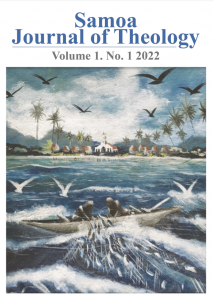
Three-Dimensional Triangular Roles of the Samoan Church Minister—Faife’au (Church Minister), Social Worker, and Counsellor
A chapter in Samoa Journal of Theology
Alesana Pala’amo
Publication details
The urgency of an Australian sense of the sacred
A chapter in St Mark’s Review
A Wurundjeri elder tells me he prefers not to travel through the Burnley tunnel under the Yarra River; in fact for a time after it was opened he completely refused to travel this road: “the river had to be diverted for the tunnel to be dug,” he tells me, “and I knew the river would be angry. Something bad would happen. People might even die because of this disturbance.” In fact the tunnel project was plagued with problems before and after its official opening in 2000, with water from the river seeping its way into the tunnel – something that didn’t surprise my friend at all. Tragically, in 2007, there was a ten-car crash in the tunnel resulting in three deaths. It is only now, after this event, that my friend finds himself prepared to drive through the tunnel, but only reluctantly and only if no other alternative is practical. There is no common-sense causal relationship between the diversion of the Yarra during the tunnel construction and the horrific accident in 2007. Furthermore, it raises uncomfortable theological questions about propitiation and the demand for sacrifice. But nor are my Wurundjeri friend’s insights falsifiable concerning the possibility of non-ordinary events on his own ancestral Country. The official inquest, however, appeared to have made no reference to Indigenous wisdom or even its possible relevance.
Publication details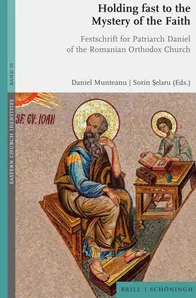
The Mission of the Church on Stolen Country: an Australian Perspective
A chapter in Holding Fast the the Mystery of Faith
In this volume, distinguished theologians and servants of the Church present their contributions as a sign of appreciation for His Beatitude Patriarch Daniel of Romania, on the occasion of his 70th anniversary.
A prominent personality, professor of Pastoral and Dogmatic Theology, honorary member of the Romanian Academy, a tireless servant of the Church, His Beatitude Daniel is well known worldwide as a vivid witness for a vibrant, dynamic and open theology, one that is profound and accessible, faithful and renovative, mystical and missionary. His extensive theological work deals with most of the fundamental aspects of theology and is grounded on the living connection between theology and spirituality, the liturgical and missionary life of the Church.
Publication details
A Pastoral Care Approach to Revisit the Practice of Tausiga o Faifeau (caring for pastor) in Samoa Today
A chapter in the Samoa Journal of Theology
Kara Siaosi
Publication details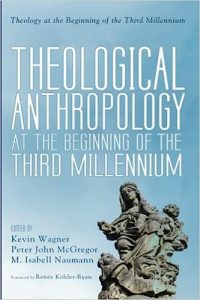
Beyond Boethius: The Clarity and Capacity of Relational Personhood
In his definition of the person as an individual substance of a rational nature Boethius asserts that person properly pertains to substance not accident. He does not consider the possibility of personhood being properly applied to relation. Taking an initial lead from Thomas Aquinas, together with Henry of Ghent and Richard of St Victor this paper develops a general definition of person based on relation. This definition highlights the triadic structure of being and enables the distinction between individual, subject and self to be clarified. Then clarifying the distinction between person and nature, this relational definition opens up an enhanced capacity for linking the reality of Christ as one divine person in two natures to the divinisation of the human person.
Publication details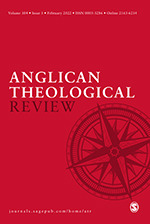
Evelyn Underhill: an Anglican “Spiritual Ecumenist”
Chapter in Anglican Theological Review 105
Evelyn Underhill (1875–1925) was an Anglican “Spiritual Ecumenist” who viewed prayer as central to Church unity. As Secretary of the Spiritual Entente, a prayer movement in the early 1920s, Underhill wrote a leaflet outlining its four aims. First, the Entente was to include members of any nationality, class, or form of Christian faith, yet loyal to their own Church affiliation. Second, the objective was to hasten the coming of God’s Kingdom by promoting spiritual unity between Christians. Third, prayer and work were central to achieving this goal. Fourth, “spiritual understanding” rather than critique was key to unity. Underhill’s four convictions were “lived” throughout her life and repeatedly emphasized in her retreat talks and letters. Underhill’s “Spiritual Ecumenism” is part of her spiritual legacy. She provided spiritual understanding and generous hospitality to Christians from all parts of the Church while also staying true to her Anglican identity.
Publication details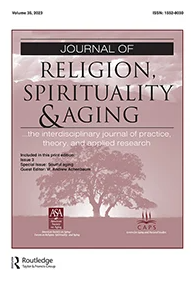
Reservoir or canal: Spiritual retreats for chaplains caring for people with dementia
Chapter in Journal of Religion, Spirituality & Aging
This research outlines and evaluates a pilot study weekend retreat to refresh Australian Aged Care chaplains (September 2022). The retreat theme of “Living Water” had four movements: “Water Cleansing the Soul”, “A-thirst for God”, Water Refreshing the Soul” and “The Well-watered Garden.” Activities included ”lectio divina”, Ignatian meditation, painting, prayer-walks and corporate worship. Participants were interviewed pre-retreat and provided written evaluations afterwards. Bernard of Clairvaux provides the guiding metaphor for this research. He argues that we need to be ”reservoirs”, large bodies of water, outpouring from places of plenty, rather than narrow ”canals”. The theoretical undergirding for this research came from the writings of Evelyn Underhill (1875–1941), a research Conductor in England in the 1920s and 30s.
Publication details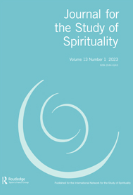
Peace and Spirituality: The Theological Kindergarten
Chapter in Journal for the Study of Spirituality
This article explores how our inner peace and spirituality are linked. It begins by very briefly mentioning ‘mindfulness’ and ‘watchfulness’, then expounds a different contemplative approach set out in the letters of Evelyn Underhill (1875–1941), a significant writer on spirituality in the first half of the twentieth century. During the Second World War, Underhill wrote to a group of women who named themselves ‘The Theological Kindergarten’, outlining spiritual practices for maintaining inner peace amidst the chaos of war. Underhill believed the roots of war lie in the spiritual realm and should be fought there, so she encouraged the women to undertake ‘spiritual war-work’, praying for the dictators. She encouraged the women to develop rhythms of daily contemplative prayer and meditation upon spiritual writings and liturgy to help them gain inner peace. Underhill also encouraged the women to try to accept their suffering and look beyond it to Eternity as well as being alert and expectant of God’s intervention. Rest and self-care were also emphasised, plus limiting exposure to war news. The current COVID-19 pandemic has often been referred to as a ‘war’ against an invisible enemy. The spiritual practices and posture that Underhill recommended to the ‘Theological Kindergarten’ during wartime provide insights regarding the cultivation and maintenance of inner peace during our current uncertain times of living with COVID, plus our global insecurity with wars and rumours of wars.
Publication details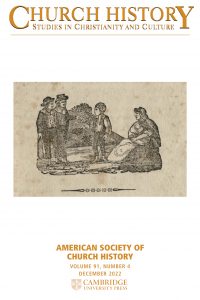
History and Spiritual Formation: Baron Friedrich von Hugel’s spiritual nurture
Chapter in Church History: Studies in Christianity and Culture
Publication details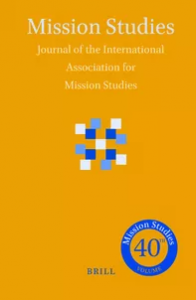


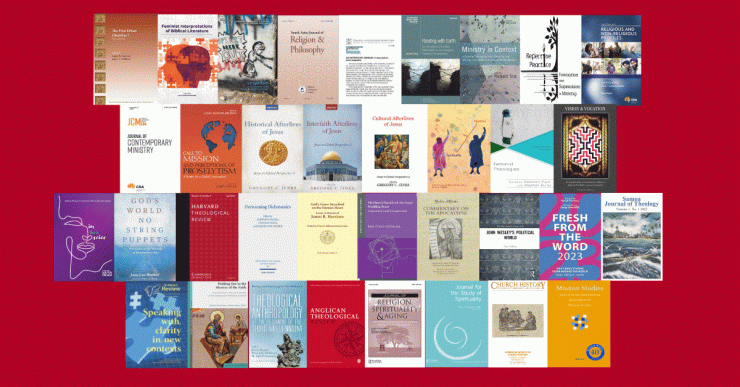


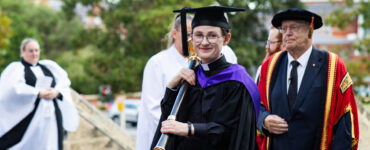
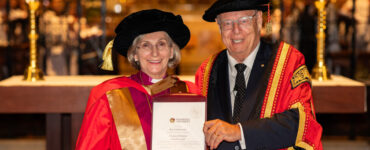
Add comment